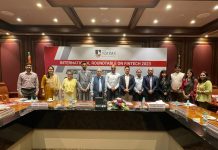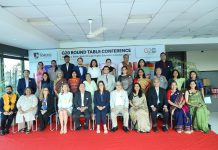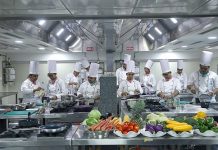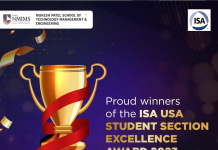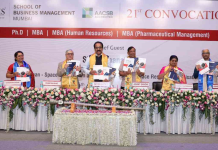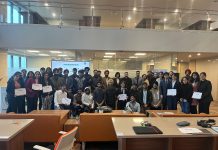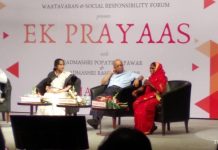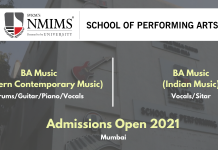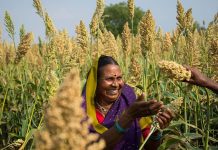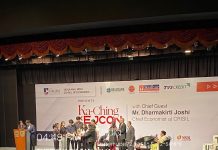Mumbai, 7 March 2020:
In our rapidly evolving world, it’s important to understand the immense role of Economics and how it has the power to shape lives across nations for the modern day humanity to flourish. It’s with this intent of exchange of ideas in Economics that the ‘4th Annual Economics Conference’ was organized by ‘Sarla Anil Modi School of Economics in collaboration with Indian Econometric Society.’


The theme of this stimulating event was ‘Sustainability, Equity & Development ‘and how by applying these principles can a society find workable ways to move ahead and progress. The event was attended by eminent researchers and participants who share a common joy of decoding Economics to create an equal society.
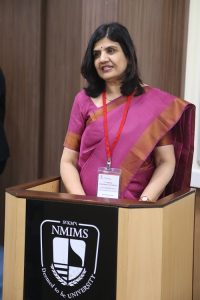 Prof. Amita Vaidya – Director, Sarla Anil Modi School of Economics, (SAMSOE) explained in simple terms that sustainable development in theory encompasses efforts to combine economic growth, environmental protection and social equity. She also shared that development is not only about economic growth and it should always be people-centric and our choices should impact the society in a positive way for the generations to come.
Prof. Amita Vaidya – Director, Sarla Anil Modi School of Economics, (SAMSOE) explained in simple terms that sustainable development in theory encompasses efforts to combine economic growth, environmental protection and social equity. She also shared that development is not only about economic growth and it should always be people-centric and our choices should impact the society in a positive way for the generations to come.
 Dr. Subhajyoti Ray – Pro Vice Chancellor, (SVKM’s NMIMS) shared that the problem of inequality is very much visible in the Indian context on a day-to-day basis wherein few people have access to all the resources. In the context of technology and human productivity, the gap was widening which was leading to a huge equity challenge. He summed it up by adding that we need to be careful while borrowing from nature and this is where our value system can help us.
Dr. Subhajyoti Ray – Pro Vice Chancellor, (SVKM’s NMIMS) shared that the problem of inequality is very much visible in the Indian context on a day-to-day basis wherein few people have access to all the resources. In the context of technology and human productivity, the gap was widening which was leading to a huge equity challenge. He summed it up by adding that we need to be careful while borrowing from nature and this is where our value system can help us.
 Dr. Leandro M De Magalhaes – Member of the Department of Economics, (University of Bristol, U.K) made it clear that social insurance sector needs to be supported on all fronts. His highly valued data, observations and arguments based on Malawi, a south-eastern landlocked African nation gave crucial insights on the influence of data in shaping policies. He also shared that the process of macroeconomics was highly desirable since it focuses on a wide range of data and parameters required to develop a cohesive idea.
Dr. Leandro M De Magalhaes – Member of the Department of Economics, (University of Bristol, U.K) made it clear that social insurance sector needs to be supported on all fronts. His highly valued data, observations and arguments based on Malawi, a south-eastern landlocked African nation gave crucial insights on the influence of data in shaping policies. He also shared that the process of macroeconomics was highly desirable since it focuses on a wide range of data and parameters required to develop a cohesive idea.
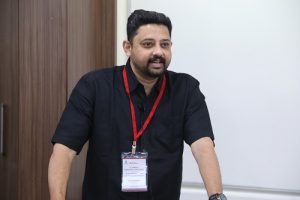 Dr. R. Ramakumar – Chairperson of the conference, NABARD & Chair Professor TISS, Mumbai) believes in the idea of ‘Alternative Perspective’ or ‘Heterodoxy in Thoughts’ which comprises wide school of thoughts from ‘Structuralist Economics’ to ‘Marxist Economics’. He emphasized that one should look at agriculture as a central figure of change. He also stressed the need to understand the distribution of surplus across classes. On a concluding note, he said that diverse discussions should be encouraged in classrooms and it’s the role of any great institution to create a space for varied thinking which leads to different traditions being explored to create a better society.
Dr. R. Ramakumar – Chairperson of the conference, NABARD & Chair Professor TISS, Mumbai) believes in the idea of ‘Alternative Perspective’ or ‘Heterodoxy in Thoughts’ which comprises wide school of thoughts from ‘Structuralist Economics’ to ‘Marxist Economics’. He emphasized that one should look at agriculture as a central figure of change. He also stressed the need to understand the distribution of surplus across classes. On a concluding note, he said that diverse discussions should be encouraged in classrooms and it’s the role of any great institution to create a space for varied thinking which leads to different traditions being explored to create a better society.
The conference was instrumental in adding a much needed dimension to understand the concepts of Economics better.




